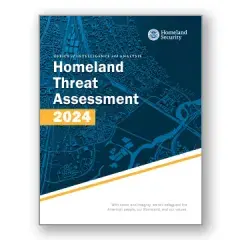Disasters from all-hazards and climate change will continue to affect our homeland and challenge DHS across a range of missions and frontline operations, exacerbating known and unknown risks to public safety and national security. Physical impacts of extreme weather and environmental degradation will increasingly intersect with human impacts of population growth, economic development, and technological innovation.

The 2024 DHS Office of Intelligence and Analysis Homeland Threat Assessment: Natural disasters pose acute and systemic threats to the United States, often converging with more traditional national security threats. Heat waves, droughts, wildfires, coastal storms, and inland flooding, have the potential to disrupt regional economies, foster health crises like disease outbreaks, and tax law enforcement resources.
The Department will be affected in the short- and long-term with rising disaster costs and losses, worsening risks of environmental degradation, critical infrastructure and supply chain disruptions, civil unrest, and social instability. Adversarial threats from terrorism and extremism will continue to emerge as malign actors seek to exploit these risks for advantage and tensions mount with particular effects on the most vulnerable.
Both the Department of Defense and the Director of National Intelligence have also identified environmental change and extreme weather as a major transnational security threats:

Director of National Intelligence Annual Threat Assessment, February 5, 2024: (PDF, 41 pgs., 0.85 MB) “The risk of U.S. national security interests are increasing as the physical effects of climate and environmental change intersect with geopolitical tension and vulnerabilities of some global systems.”

Department of Defense Climate Risk Analysis, October 2021: (PDF, 18 pgs., 1.5 MB) “Climate change is reshaping the geostrategic, operational, and tactical environments with significant implications for U.S. national security and defense.”
